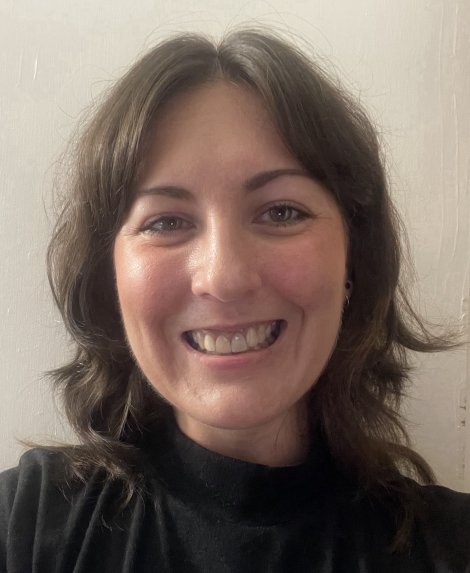Teaching and Research Areas:
- World Literature
- Comparative Literature
- Film Studies
- Horror and Science Fiction
- Environmental Humanities, Animal Studies, Posthumanism, and Critical Plant
- Studies
- Polish Studies
- Russian Studies
- Slavic Studies
- Soviet and Post-Soviet Studies
Education:
- Ph.D., Comparative Literature, The University of California, Riverside
- M.A., Slavic Languages and Literatures, The University of Chicago
- B.A., English & B.A., Russian Language and Culture, University of Florida
Monographs in Progress:
- Becoming-With: Ecological Ethics and the More-Than-Human Worlds of Russian and American Horror
- The Disintegration of the Real: Glasnost’ and Late Soviet Science Fiction
Peer-Reviewed Articles and Book Chapters:
- "Modernity, Environmentalism, and Russian Science Fiction: 1890s-1930s.” The Liverpool Handbook of Environmental Science Fiction, edited by Eric Otto, Liverpool University Press (abstract accepted; manuscript in progress; projected publication 2027).
- “‘I’m Dying in Russia’: Necropolitics and the Mournful Undead in the Horror Music Videos of IC3PEAK.” Contemporary Slavic Horror Across Media: Cursed Zones, edited by Agnieszka Jezyk, Manchester University Press, 2025, pp. 3-19.
- “Russian-Language Science Fiction.” The New Routledge Companion to Science Fiction, edited by Mark Bould, Andrew M. Butler, and Sherryl Vint, Routledge, 2024, pp. 60-9.
- “‘This Bird Made an Art of Being Vile’: Ontological Difference and Uncomfortable Intimacies in Stephen Gregory’s The Cormorant.” Fear and Nature: Ecohorror Studies in the Anthropocene, edited by Christy Tidwell and Carter Soles, Penn State University Press, 2021, pp. 174-94.
- “Between the Living and the Dead: Vegetal Afterlives in Evgenii Iufit and Vladimir Maslov’s Silver Heads.” Plants in Science Fiction: Speculative Vegetation, edited by Katherine Bishop, David Higgins, and Jerry Määttä, University of Wales Press, 2020, pp. 81-104.
- “Human Trespass, Inhuman Space: Monstrous Landscapes in Carter Smith’s The Ruins.” The Spaces and Places of Horror, edited by Francesco Pascuzzi and Sandra Waters, Vernon Press, 2019, pp. 55-73.
- “Helping Eleanor Come Home: A Reassessment of Shirley Jackson’s The Haunting of Hill House.” The Irish Journal of Gothic and Horror Studies, no. 16, 2017, pp. 67-93.
Selected Paper Presentations and Roundtables:
Roundtable: “Book Discussion: Contemporary Slavic Horror Across Media: Cursed Zones, by ed. Agnieszka Jeżyk.” Association for Slavic, East European, and Eurasian Studies, 2025 (Washington, D.C.).
“The Closed Circuit of Russian History in Karen Shakhnazarov’s Zero City.” Forgotten, Misplaced, Marginalized: Speculations We Don’t See, 2025 (Warsaw, Poland).
Roundtable on “Slavic Neo-Gothic and Horror Media of the Last 100 Years.” American Association of Teachers of Slavic and East European Languages, 2025 (virtual).
“‘The History of Humanity Is Its Murder of Nature’: Technology, Ecocide, and the Ambiguous Utopia of Andrei Platonov’s ‘Descendants of the Sun.’” American Association of Teachers of Slavic and East European Languages, 2025 (virtual).
“The Nuclear Ethics of Konstantin Lopushansky’s Letters from a Dead Man.” Petrocultures Research Group, 2024 (Los Angeles, CA).
- President-convened roundtable on “Critical Definitions of World Science Fiction.” Science Fiction Research Association, 2023 (Dresden, Germany).
- “If You’re Not a Beautiful Monster, You’re a Villager’: Becoming-Werewolf and the Posthuman-to-Come in Stephen Graham Jones’s Mongrels.” International Conference on the Fantastic in the Arts, 2022 (Orlando, FL).
- “Crossing the Invisible Circle: Anthropocentrism, Speculative Realism, and the Occulted Universe of Aleksandr Sokurov’s Days of Eclipse.” American Association of Teachers of Slavic and East European Languages, 2022 (Philadelphia, PA).
- Roundtable on “Uncertainty at the End of the World: Karen Shakhnazarov’s Gorod Zero and the Collapse of the Soviet Union.” Association for Slavic, East European, and Eurasian Studies, 2021 (New Orleans, LA).
- “‘I’m from a Terrifying Russian Fairy Tale’: Horror, Disaffection, and Dissent in the Music Videos of IC3PEAK.” Association for Slavic, East European, and Eurasian Studies, 2021 (New Orleans, LA).
- “The Soviet Anthropocene: Desiccation, Desertification, and the Horror of Animality in Dmitrii Svetozarov’s Hounds.” Association for the Study of Literature and Environment, 2021 (virtual).
- “Ecological Intimacies in the Anthropocene: Horror, Ethics, and the Shadow of Nonhuman Difference.” American Comparative Literature Association, 2021 (virtual).
- “‘The Underground People’: Meditations on the Last Humanists in Konstantin Lopushansky’s Letters from a Dead Man.” Association for Slavic, East European, and Eurasian Studies, 2020 (virtual).
- “Advertising for the Void: Consumer Capitalism and the Collapse of the Real in Viktor Pelevin’s Homo Zapiens.” London Science Fiction Research Community, 2020 (virtual).
- Roundtable on “Reinterpreting Nonsense.” Modern Language Association, 2019 (Chicago, IL).
- Roundtable on “Speculative Vegetation: Plants in Science Fiction.” International Conference on the Fantastic in the Arts, 2018 (Orlando, FL).
Frequently Taught Classes:
- ENG 2040: World Literature Since 1650
- ENG 2190: Science Fiction and Fantasy (taught as World Science Fiction Since World War II)
- ENG 2360: American Literature and the Arts (taught as American Weird Fiction, 1830s-Present)
- ENG 2430: Animals and Literature (taught as Animals in World Literature and Cinema)
- ENG 3715: Literature and Environment (taught as Speculative Fiction and the Anthropocene)
Biography:
Brittany Roberts joined the App State community in Fall 2023. Her research and teaching center on twentieth- and twenty-first-century Russian, American, and world literature and cinema with particular interests in horror, science fiction, the environmental humanities, animal studies, posthumanism, and critical plant studies. Her monograph-in-progress, titled Becoming-With: Ecological Ethics and the More-Than-Human Worlds of Russian and American Horror, conducts a comparative analysis of Russian and American horror literature and cinema focusing on how the genre has
offered posthumanist alternatives to anthropocentrism in the twentieth and twenty-first centuries. A second book project is in its early stages, titled The Disintegration of the Real: Glasnost’ and Soviet Science Fiction, which examines the cultural and political significance of late Soviet science fiction literature and cinema from a transnational, comparative perspective. At App, Brittany is co-coordinator of the Animal Studies minor
and regularly teaches classes in world literature, science fiction and horror, animal studies, and environmental humanities. An avid fan of horror, science fiction, and music as well as outdoor enthusiast, Brittany enjoys reading, filmgoing, attending concerts, hiking, and exploring North Carolina.

Title: Assistant Professor
Department: Department of English
Email address: Email me